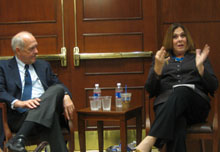
September 15, 2009 — To kick off the fall brown-bag speaker series, the Shorenstein Center welcomed Candy Crowley, CNN‘s senior political correspondent. Introducing Crowley, Shorenstein Center director Alex S. Jones said that she “stands for a kind of journalism that is genuinely endangered but that she fulfills at its highest level.”
The title of Crowley’s talk was “Obama: Down to the Nitty-Gritty,” and she outlined two issues she felt were beginning to define the new president: health care reform — becoming known as “insurance reform,” Crowley said — and the war in Afghanistan. These issues are putting “flesh on bones,” making Obama seem more like other presidents and less like the presidential candidate carrying a steady 60 percent approval rating.
The debate about health care, said Crowley, has become a caricature of “big, evil insurance companies verses the bumbling federal government.” She predicted that by Thanksgiving Obama would sign “something that says reform” because he understands “the Ted Kennedy approach”: Get what reforms he can now, then follow up with more legislation in the future. Because health care reform is “too important to fail” for the Democrats, Crowley said, they will vote for a bill without a public option rather than vote against reform.
In Crowley’s assessment, the war in Afghanistan is even “more important than health care.” “How [Obama] maneuvers through this will define what is still yet a very new presidency.” She discussed “the Americanization” of the Afghanistan war, calling the conflict “life and death on a daily basis.” The president made a strong commitment to Afghanistan during the campaign, Crowley said, but the “mission needs definition” to gain public support.
Reflecting on the Republican party, Crowley described it as “still a party without a leader, but they are beginning to see a cause” in drawing limits on government action.
This article was written by Janell Sims and the photos taken by Leighton Walter Kille, both of the Shorenstein Center.

